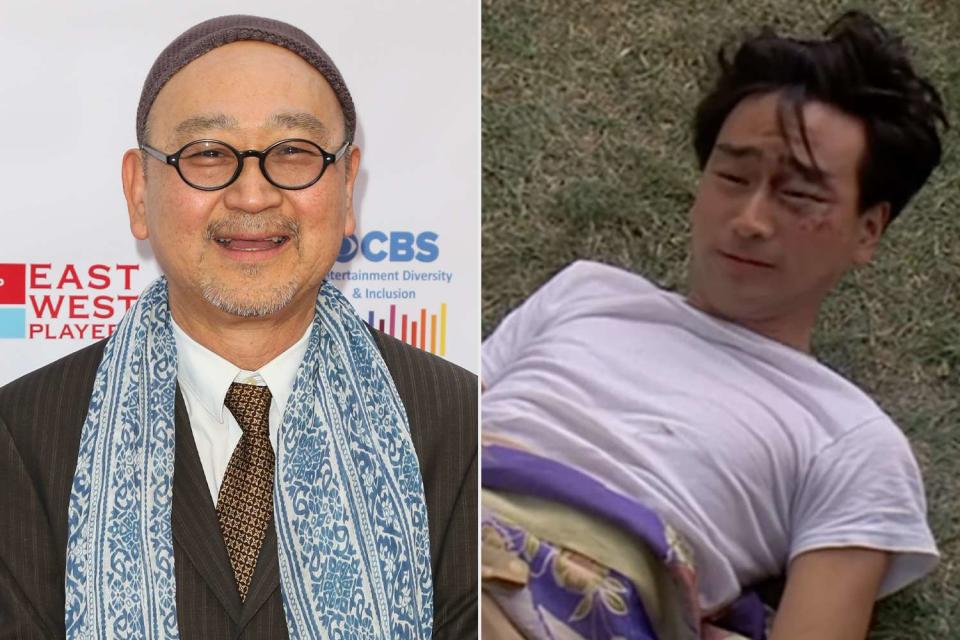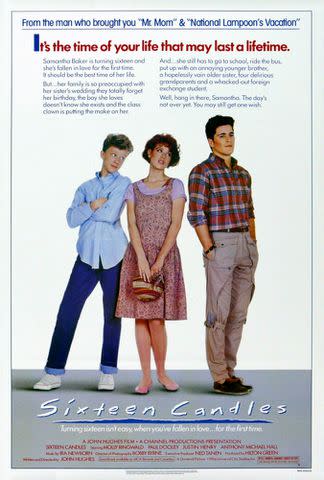Gedde Watanabe Says He Didn't Find His “Sixteen Candles” Role Long Duk Dong Offensive at the Time (Exclusive)
The Japanese-American actor, who was born and raised in Utah, says he was just thrilled to see they were casting an Asian in any movie

Getty;Universal Pictures
Gedde Watanabe now, and as Long Duck Dong in Sixteen CandlesIt's been 40 years since Sixteen Candles was released in theaters, and while times have certainly changed — and Molly Ringwald recently opened up about parts of the movie that haven't aged well — Gedde Watanabe, who played foreign exchange student Long Duk Dong, says he didn't realize his character was an offensive stereotype.
"Frankly I was like, this is a good job, and I'm going to get paid more doing one week in this movie that I did for all the years I was in the theater," Watanabe, now 68, tells PEOPLE.
"It didn't really occur to me that it was a stereotype, because there wasn't really anything out there for Asian actors at the time. It was just so scarce. So I didn't think it was stereotypical or racist. Isn't that weird?" he continues.
Watanabe notes, however, that he of course knew some lines were problematic.
"I remember the movie using the word 'Chinaman,' and even then I was like, "Oh, that's not great.' But you also have to remember in that period of time, people still had to be educated about parameters, what the alarm bells were when it came to being offensive," he says.
Related: Molly Ringwald Reflects on 'Sixteen Candles' in Wake of #MeToo: 'There Were Parts That Bothered Me'
Four decades later, Watanabe says he's fascinated by the way the character is such a driver of conversation. The actor, who was born and raised in Utah and speaks with an American accent, says he was just acting in a comedic role.
"I wasn't even sure I could even pull it off," he says of putting on Dong's heavy foreign accent. "But I had a friend who sort of sounded like him, and he helped me and let me listen to him and would talk with me, and then I went in and auditioned and got it."
Watanabe adds that he stayed in character even after he got the role, and it wasn't until he was at a table read in Chicago that he broke character and spoke in his regular accent — completely surprising John Hughes, the film's writer and director.
"He totally burst out laughing," Watanabe says with a laugh. "He was in shock."
Watanabe also says that, in a weird way, he felt that Hughes almost played against Asian stereotypes in that Dong got the sexy American girlfriend. "That was really unusual in a sense, for the Asian character to get the girl and party and be in bliss like that," he explains.

Universal Pictures
The poster for the 1984 teen comedy Sixteen CandlesNowadays, Watanabe says people are still obsessed with quoting Long Duk Dong's memorable lines back to him, something he was originally bothered by.
"You go through a period where it's really annoying, but as you get older it's almost sweet. You get where they're coming from," he says of the movie's die-hard fans. "So I don't take it as anything bad."
"In the '80s, my career was playing a lot of foreign people from other countries," he continues. "As I got older that tipped away, which I'm thankful for, but the '80s were a hard time for Asian American actors, AAPI people, there wasn't a lot out there," Watanabe adds. "There was no real support to guide me about the fine line between being a goof in comedy and what's stereotypical and what's offensive now."
Watanabe adds, "Now it's been somewhat defined, but it's muddied still. But I think that the new Asian actors that are coming up, all the shows that are coming out, is really so exciting. It's great to see friends out there that aren't just one-dimensional characters."
Watanabe also says that the Long Duk Dong character has actually been a driver of positive change in that regard. "People study him in the Asian studies class," he says. "In some ways, that takes the sting out of the role. People are having conversations about him. It's interesting that this one role did so much."
These days, Watanabe is living in Southern California and still acting as roles come up, mostly in theater. In fact, he got his start in musicals after he was discovered on a street corner singing in San Francisco when he was 19.
"I skipped college and moved to San Francisco, and I really wanted to be a folk singer," he tells PEOPLE.
A casting director heard him singing on the street and offered him a role in Pacific Overtures. He then moved to New York City and did plays and musicals while also working at the Metropolitan Museum of Art. "I loved it," he says of his Bohemian lifestyle.
After Sixteen Candles, his career blew up and his life changed, and he went on to act in movies like Volunteers and Gung Ho. "The '80s were a wild ride!" he says with a laugh.
These days, Watanabe says he spends a lot of his time reading, learning and speaking about the Japanese internment camps, which his mother had been a part of.
"I think a lot of information is finally coming out about those times," he says. "The new generation is speaking up about it. If you remember in the history books when we were growing up, it was like just a little blurb. I remember asking my mom about it, and thought she meant summer camps. They didn't really talk about it. But the more you learn, you know that it was a pretty shocking time."
Watanabe adds, "But I'm not retired from acting. I hate when actors say they're 'retired,'" he adds with a laugh. "Because you know if someone called offering a role, they're going to say 'Of course!'"
For more People news, make sure to sign up for our newsletter!
Read the original article on People.


